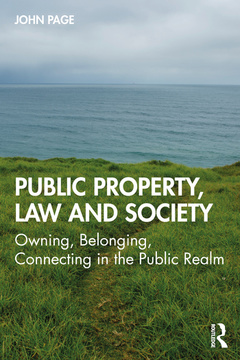Public Property, Law and Society Owning, Belonging, Connecting in the Public Realm
Auteur : Page John

This book examines the almost entirely neglected realm of public property, identifying and describing a number of key organizing principles around which a nascent jurisprudence of public property may be developed.
In property law terms, the public realm is lost to plain view. Despite the vast acreage of public lands, or the extensive tracts of private lands over which public rights subsist, there is little commensurate scholarly discussion of the ideas, theories, practices, and laws of public property. This is no accident. Public property has been marginalized and pushed to the periphery for centuries, a consequence of the dominant discourse of private property, and its enclosing, encroaching tendencies. This book explores the rich diversity of the public estate, of what the public realm means for us, the general public, canvassing what we may ?own?, where we may ?belong?, or not, and how we may ?connect? through a shared use and enjoyment of public place and space. To better understand public property is to better value its critical public-wealth. Whether overlooked, over-used, or under threat of imminent loss, this book maintains that our loved (and not so loved) public spaces are essential components of our diverse, functioning, and optimistically livable human geographies. As such, they demand legal protection.
This important and original book will be of considerable interest to scholars and others with interests in property and land law, socio-legal studies, legal geography and urban studies.
Chapter 1 - Introduction
Chapter 2 – Of public order
Chapter 3 – Of public owning
Chapter 4 – Of sociability, human flourishing, and the well-lived public life
Chapter 5 – Of public belonging
Chapter 6 – Of public connection
Chapter 7 – Of democracy, protest, and the public square
Chapter 8 – Conclusion
John Page is a Professor of Law at the School of Law and Justice at Southern Cross University, Australia.
Date de parution : 12-2020
15.6x23.4 cm
Date de parution : 12-2020
15.6x23.4 cm
Thèmes de Public Property, Law and Society :
Mots-clés :
Public Estate; public property jurisprudence; Public Real; legal protection; Te Urewera; socio-legal studies; Public Trust Doctrine; public land law; Public Infrastructure; nascent jurisprudence; Public Things; Public Rights; Public Belonging; Private Capture; Settler Colonial State; Unorganized Public; Public Lands; Grand Staircase Escalante National Monuments; Non-private Property; Public Sociability; Spatial Justice; Public Purpose; Zealand’s High Country; Sunny; Te Awa Tupua; Open Air Recreation; Mono Lake; Good Life; Forest Charter; Public Land Law Review Commission



